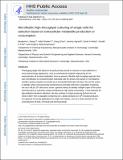Microfluidic high-throughput culturing of single cells for selection based on extracellular metabolite production or consumption
Author(s)
Ghaderi, Adel; Zhou, Hang; Agresti, Jeremy; Stephanopoulos, Gregory; Wang, Benjamin L.; Weitz, David A.; Fink, Gerald R; ... Show more Show less
DownloadMicrofluidic high-throughput.pdf (615.6Kb)
OPEN_ACCESS_POLICY
Open Access Policy
Creative Commons Attribution-Noncommercial-Share Alike
Terms of use
Metadata
Show full item recordAbstract
Phenotyping single cells based on the products they secrete or consume is a key bottleneck in many biotechnology applications, such as combinatorial metabolic engineering for the overproduction of secreted metabolites. Here we present a flexible high-throughput approach that uses microfluidics to compartmentalize individual cells for growth and analysis in monodisperse nanoliter aqueous droplets surrounded by an immiscible fluorinated oil phase. We use this system to identify xylose-overconsuming Saccharomyces cerevisiae cells from a population containing one such cell per 10[superscript 4] cells and to screen a genomic library to identify multiple copies of the xylose isomerase gene as a genomic change contributing to high xylose consumption, a trait important for lignocellulosic feedstock utilization. We also enriched L-lactate–producing Escherichia coli clones 5,800× from a population containing one L-lactate producer per 10[superscript 4] D-lactate producers. Our approach has broad applications for single-cell analyses, such as in strain selection for the overproduction of fuels, chemicals and pharmaceuticals.
Date issued
2014-04Department
Massachusetts Institute of Technology. Department of Biology; Massachusetts Institute of Technology. Department of Chemical Engineering; Whitehead Institute for Biomedical ResearchJournal
Nature Biotechnology
Publisher
Nature Publishing Group
Citation
Wang, Benjamin L, Adel Ghaderi, Hang Zhou, Jeremy Agresti, David A Weitz, Gerald R Fink, and Gregory Stephanopoulos. “Microfluidic High-Throughput Culturing of Single Cells for Selection Based on Extracellular Metabolite Production or Consumption.” Nature Biotechnology 32, no. 5 (April 6, 2014): 473–478.
Version: Author's final manuscript
ISSN
1087-0156
1546-1696